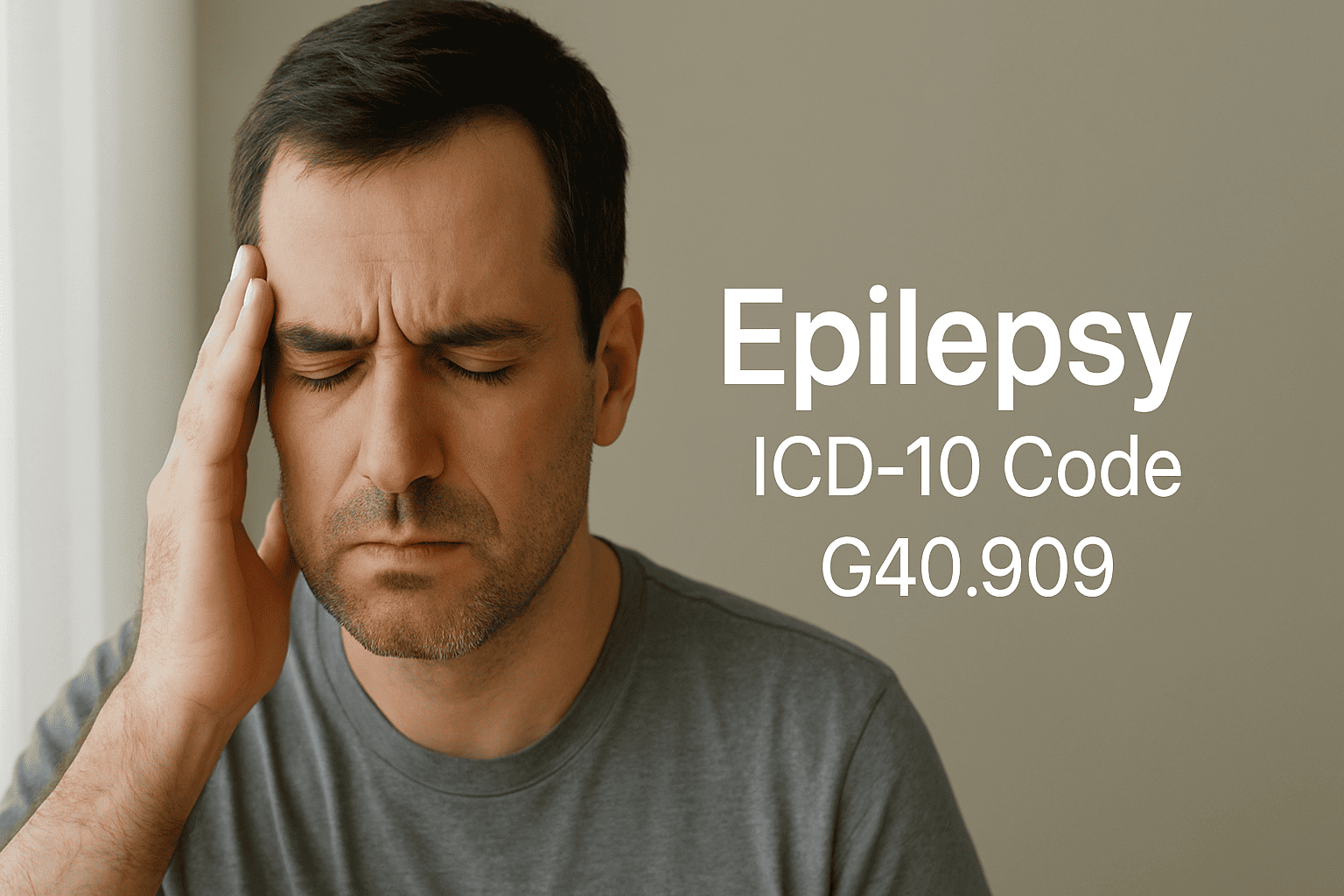Updated on: July 25, 2025
Epilepsy is a chronic neurological disorder marked by recurrent unprovoked seizures. It can manifest in multiple forms, including focal, generalized, and unknown-onset types. ICD-10 code G40.909 is used when epilepsy is diagnosed, but the seizure type, etiology, or intractability is not specified.
ICD-10 Code G40.909: Code Breakdown
-
G40 = Epilepsy and recurrent seizures
-
.9 = Epilepsy, unspecified
-
0 = Not intractable
-
9 = Without status epilepticus
Use G40.909 when:
-
The patient has a confirmed epilepsy diagnosis
-
No specific seizure type or syndrome is documented
-
Seizures are controlled or infrequent (not intractable)
-
There is no status epilepticus (a prolonged or repeated seizure state)
When to Use G40.909
G40.909 is appropriate:
-
In initial diagnosis prior to full seizure classification
-
When documentation lacks seizure type (generalized vs focal)
-
When epilepsy is controlled with medication
-
In routine follow-up for seizure monitoring
⚠️ Important: Avoid G40.909 long-term—update to a more specific code once seizure type is confirmed.
Related Specific ICD-10 Epilepsy Codes
| ICD-10 Code | Description |
|---|---|
| G40.019 | Localization-related epilepsy, intractable |
| G40.309 | Generalized idiopathic epilepsy, not intractable |
| G40.209 | Epileptic spasms, not intractable |
| G40.909 | Epilepsy, unspecified, not intractable |
💡 More specific codes improve documentation quality and support better treatment alignment.
Common Symptoms and Presentation
To support an epilepsy diagnosis:
-
Recurrent seizures (≥2 unprovoked, ≥24 hours apart)
-
Aura, confusion, or postictal fatigue
-
Muscle jerking or convulsions
-
Loss of awareness or consciousness
-
Triggers (stress, sleep deprivation, medication noncompliance)
Sample Clinical Documentation for G40.909
“Patient presents with history of 3 unprovoked seizures over the past year. Currently seizure-free on levetiracetam. EEG findings pending. No recent episodes of status epilepticus. Diagnosis: Epilepsy, unspecified, not intractable (G40.909).”
Diagnostic & Treatment Workflow
-
Initial evaluation:
-
Neurological exam
-
Labs (metabolic panel, glucose)
-
Imaging (MRI brain)
-
EEG (routine or ambulatory)
-
-
Confirm epilepsy diagnosis
-
Initiate antiepileptic drug (AED) therapy (levetiracetam, lamotrigine, etc.)
-
Monitor for breakthrough seizures
-
Educate on triggers, driving restrictions, and lifestyle modifications
DocScrib ensures this entire workflow is captured with structured, ICD-10-compliant documentation.
Commonly Paired ICD-10 Codes
| Associated Condition / Management | ICD-10 Code |
|---|---|
| Long-term antiepileptic use | Z79.899 |
| Convulsions, not otherwise specified | R56.9 |
| Post-traumatic epilepsy | G40.309 |
| Developmental delay | F84.0 |
| Driving restrictions due to seizures | Z72.820 |
📌 Pair G40.909 with any trigger, comorbidity, or neurological finding to support complete claims.
Documentation Tips for G40.909
To ensure correct coding:
-
Clearly state “epilepsy” (not just “seizure” or “convulsion”)
-
Indicate that epilepsy is controlled or non-intractable
-
Document absence of status epilepticus
-
Mention ongoing treatment or therapy (e.g., AED compliance)
-
Note any workup in progress (EEG, MRI, genetic testing)
🧠 Best practice: Update to more specific G40.x code when additional seizure info becomes available.
Importance for Reimbursement & Care Planning
-
G40.909 is not an HCC code, but is used for:
-
Chronic care management billing
-
Neurology specialty consultations
-
Medication monitoring and refills
-
Disability support or DMV documentation
-
Failure to update to a more specific epilepsy code may result in:
-
Claim delays
-
Incomplete problem lists
-
Missed medication reconciliation cues
How DocScrib Supports Epilepsy Care Documentation
Neurology encounters are often data-dense and require:
-
Detailed HPI about seizure frequency and aura
-
Review of EEG and medication response
-
Clear follow-up plans
DocScrib’s AI scribe:
-
Captures real-time seizure descriptions and intervals
-
Pulls EEG/MRI results into assessment
-
Suggests updated ICD-10 codes based on dictation
-
Supports medication reconciliation with auto-filled med history
👉 Discover how DocScrib enhances neurology workflow
Frequently Asked Questions
What’s the difference between seizures (R56.9) and epilepsy (G40.909)?
-
R56.9 = Single seizure or unspecified convulsion (acute)
-
G40.909 = Recurrent unprovoked seizures = chronic epilepsy diagnosis
Is G40.909 used for febrile seizures?
No. Use R56.00 for simple febrile seizures.
When should I update from G40.909?
Update when seizure type (e.g., focal, generalized), intractability, or status epilepticus is determined through EEG or clinical course.
Conclusion
ICD-10 Code G40.909 is a useful placeholder code for epilepsy when seizure type, cause, or severity is not yet specified. However, providers should aim to refine this diagnosis as more clinical data becomes available. With AI-powered tools like DocScrib, your neurology practice can ensure epilepsy care is thoroughly documented, efficiently coded, and always audit-ready.
